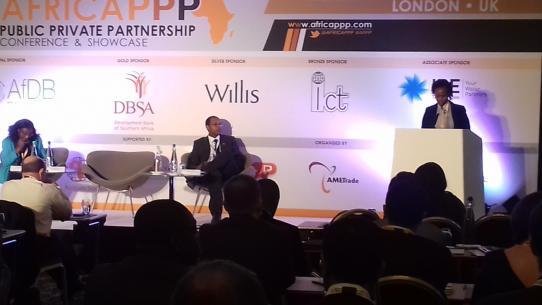I had the opportunity of attending the Africa PPP Conference & Showcase in London on November 10-11th for which InfraPPP was a media partner.
I had the opportunity of attending the Africa PPP Conference & Showcase in London on November 10-11th for which InfraPPP was a media partner. First of all, I would like to congratulate the team led by Mahad Ahmed, Managing Director of AME Trade, the company organizing the event. I think they did an excellent good job putting an interesting line-up of speakers and having a good turnout with a mix of public officials and private sector professionals.

In my opinion, the main takeaway of the event was that there is a big disconnection between what the African public sector wants and what the private sector can provide.
I think there was agreement in the audience on the fact that the lack of good-structured PPP projects is the real problem to have a more extended use of the PPP model in the African continent to fill the $93 billion per year infrastructure gap (World Bank).
The lack of investors and financiers willing to fund these projects is no longer an issue, as the audience and panelists agreed at the event.
From all comments at the event and in our opinion, the team at InfraPPP believes governments in Africa need to understand that to structure good PPP projects there are four key factors:
- Prioritizing projects in the PPP pipeline: As Ms. Kodeidja Diallo, the Director of the Private Sector department at the African Development Bank, said at the conference: projects need to create inclusiveness, projects must have long-term sustainability and affordability and the projects need to have value for investors and the community. In other words, it is important that we first consider projects with an existing great demand from the community and that generate sufficient returns for the investors without government support, not projects that benefit a very reduced amount of users. It may sound obvious but when ones analyzing the PPP pipelines in certain countries in Africa, this question arises.
- Selecting the right advisors for the project: This sounds also repetitive and obvious but I think that there is no a clear understanding among African public officials on the resources needed to structure a good PPP project. Hiring a team of Transaction Advisors (including legal, financial and technical consultants) clearly influences the outcome of a potential PPP project down the road. This team will advise the government on the feasibility of the project, the preparation of tender documents, the attraction of private investors (having a 2 or even 3 stage tender process and doing market sounding exercises), and the closure of financing for the project. We also consider it is important that the fees of the consultants are not mostly success-based remunerated because it creates a misalignment between the parties that may influence for the right development of the project.
- Designing competitive procurement processes: Francesco Totaro, of the European Investment Bank (EIB), highlighted this at the conference. The EIB does not consider financing a project if there was not a public, open and transparent procurement process. Attracting a certain level of competition is crucial to make sure that the community gets the best competitive deal.
- Considering national guarantees to investors: This is not something that happens just in emerging markets, we have seen as PPP projects in the UK, for example, needed national guarantees to move to the financial close. Given the political risk of certain countries in Africa and the lack of national development plans with full political support, it is important that governments show commitment to investors for the development of the existing PPP pipelines and guarantees can generate the necessary trust in the investors community.
Although the speakers explained in detail several case studies of successful PPP projects in Africa such as the Dakar Diamniadio toll road in Senegal, the Henry Konan Toll Bridge Project in Cote d’Ivoire or the Renewables program in South Africa, I did miss more information on other PPP projects that were recently signed or awarded in Africa during the last year. Examples of this would be:
- Agadir desalination plant PPP in Morocco –sponsored in 2015 by Abengoa
- University of Ghana student housing PPP project – signed in 2015 by Africa Integras
- Kennyata University student housing PPP project in Kenya – signed in 2015 by Africa Integras
- Njakwa-Livingstonia-Chitimb road PPP project in Malawi – signed in 2015 by Mota Engil
- Kigali water PPP project in Rwanda – signed in 2015 by Metito
Overall, during 2015 we recorded in our database of PPP projects (http://infrapppworld.com/project-tracker) in the transport, social & health and water & waste sectors four projects awarded, four projects that achieved commercial close, and only one project that got financial close.
Another important point that was discussed at the conference was the need of constant capacity building so that government officials in Africa are prepared on the difficult task of tendering PPP projects. As Mr. James Aiello, Senior Project Advisor of South Africa’s National Treasury, said, capacity building never ends; every year there is a need to capacitate new government officials at different ministries or the same government officials with updated practices.
We believe learning by doing is the only way for governments to attract the private sector to fund all the necessary projects through the PPP model in the continent. To have future successes, governments must start to improve their hiring, tendering and procurement processes.
Álvaro de la Maza – Partner of InfraPPP Advisory
e: ama@infrapppworld.com
